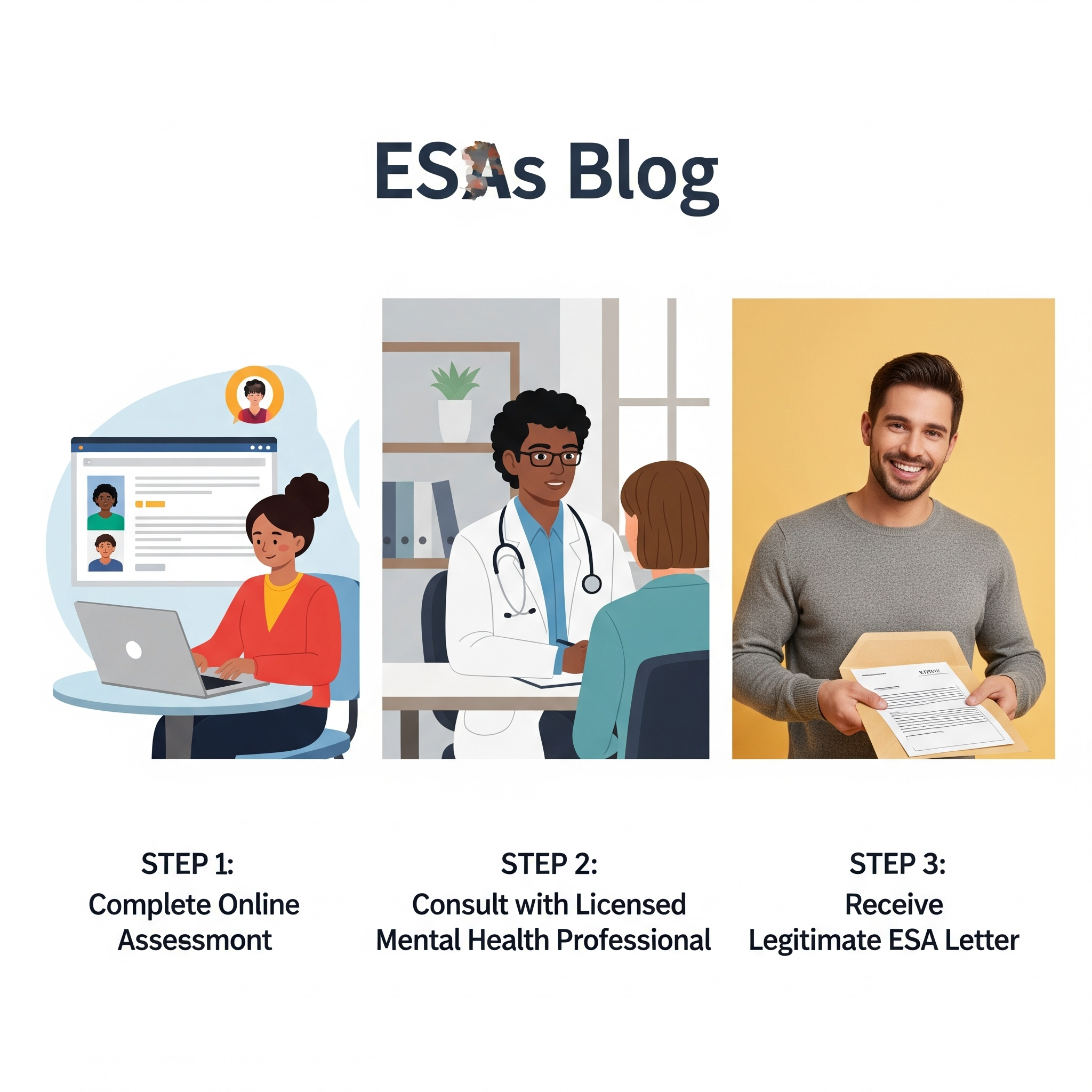Navigating the complexities of mental health can be a challenging journey, and finding the right support system is paramount. For some individuals, a Psychiatric Service Dog (PSD) can become an invaluable partner, offering not only unwavering companionship but also performing specific, trained tasks that directly mitigate symptoms of their mental health disability. However, understanding whether a PSD is the appropriate form of support requires careful consideration and evaluation. This comprehensive guide, brought to you by CertifyESA, your trusted provider of legitimate ESA and PSD letters and resources, will explore the key indicators and considerations to help you determine if a PSD might be the right path for you.
Distinguishing Between ESAs and PSDs: Understanding the Difference
Before delving into the indicators, it’s crucial to clearly differentiate between Emotional Support Animals (ESAs) and Psychiatric Service Dogs (PSDs). While both provide therapeutic benefits, their legal classifications, training requirements, and public access rights differ significantly.
- Emotional Support Animals (ESAs): ESAs provide comfort and support through their presence. Their primary role is to alleviate emotional distress simply by being with their handler. They are typically protected under the Fair Housing Act (FHA), allowing them to live in “no pet” housing. However, they generally do not have the same public access rights as service animals.
- Psychiatric Service Dogs (PSDs): PSDs are specifically trained to perform tasks that directly assist individuals with mental health disabilities. These tasks can range from reminding handlers to take medication to interrupting self-harming behaviors or providing deep pressure therapy during moments of crisis. Due to their specialized training, PSDs have public access rights under the Americans with Disabilities Act (ADA).
Understanding this distinction is the first step in determining if your needs align with the specific role and training of a PSD.
Key Indicators That a Psychiatric Service Dog Might Be Necessary
Consider the following indicators and experiences to help evaluate if a PSD could be a beneficial form of support for your mental health:
1. Your Mental Health Disability Substantially Limits Major Life Activities:
- Explanation: To qualify for a PSD, you must have a diagnosed mental health disability (such as severe anxiety, depression, PTSD, bipolar disorder, or others) that significantly impacts your ability to perform daily life activities. These activities can include working, sleeping, socializing, leaving the house, managing medication, or maintaining safety.
- Self-Reflection: Do your mental health symptoms frequently interfere with your ability to function in these key areas of your life? Are these limitations persistent and significant?
2. Current Treatment Approaches Are Insufficient:
- Explanation: While therapy, medication, and other coping strategies are essential components of mental health management, some individuals find that these approaches alone do not provide adequate support for their most debilitating symptoms. A PSD can serve as a valuable adjunct to your existing treatment plan.
- Self-Reflection: Are you actively engaged in therapy and/or taking prescribed medication? Despite these efforts, are you still experiencing significant challenges managing acute symptoms or specific disability-related needs?
3. You Experience Specific, Predictable Symptoms That a Dog Can Be Trained to Mitigate:
- Explanation: PSDs are trained to perform specific tasks tailored to their handler’s needs. Consider if you experience predictable symptoms or situations where a trained dog could provide direct assistance.
- Examples of PSD Tasks:
- Medication Reminders: Alerting the handler when it’s time to take medication.
- Crisis Intervention: Interrupting self-harming behaviors, providing tactile stimulation during panic attacks, or fetching help.
- Grounding Techniques: Providing deep pressure therapy to alleviate anxiety or dissociation.
- Environmental Scanning: Alerting to potential triggers or changes in the environment.
- Guiding During Disorientation: Safely guiding the handler during episodes of anxiety or dissociation.
- Waking During Nightmares: Alerting the handler during distressing nightmares.
- Self-Reflection: Do you experience specific symptoms or situations where one or more of these types of trained tasks could significantly improve your safety, independence, or ability to cope?
4. You Have the Capacity to Care for and Train a Dog:
- Explanation: Owning a PSD is a significant responsibility that requires time, energy, and financial resources. You must be physically and emotionally capable of providing for the dog’s needs, including feeding, grooming, exercise, veterinary care, and ongoing training.
- Self-Reflection: Are you able to consistently meet the physical and emotional needs of a dog? Do you have the time and commitment to participate actively in the dog’s training and maintain their skills?
5. You Are Committed to Public Access Training and Responsible Handling:
- Explanation: If you intend to utilize your PSD in public spaces, you must be committed to ensuring they are impeccably behaved and well-trained in public access manners. This includes remaining calm and quiet, not soliciting attention, staying close to you, and being reliably house-trained.
- Self-Reflection: Are you prepared to invest the time and effort required for public access training? Are you committed to being a responsible handler who ensures their PSD is not disruptive in public settings?
6. Other Forms of Support Have Not Been Sufficient for Specific Needs:
- Explanation: You may have explored other support systems, such as relying on human companions or less intensive animal support like ESAs, but found them insufficient for addressing specific, critical needs related to your disability.
- Self-Reflection: Have you previously relied on other forms of support for your mental health? If so, what specific limitations did you encounter that a PSD’s trained tasks could potentially overcome?
7. You Have a Strong Desire to Partner with a Service Animal:
- Explanation: The bond between a PSD and their handler is unique and requires a strong desire for this type of partnership. A PSD is not simply a pet; they are a working partner who will be closely integrated into your daily life.
- Self-Reflection: Are you genuinely drawn to the idea of partnering with a service animal and willing to embrace the responsibilities and unique relationship it entails?
The Process of Obtaining a Psychiatric Service Dog
If, after careful consideration, you believe a PSD might be right for you, the next steps typically involve:
- Consulting with Your Mental Health Professional: Discuss your interest in a PSD with your therapist, psychiatrist, or other licensed mental health professional. They can provide valuable insight into whether a PSD aligns with your treatment goals and overall well-being.
- Researching PSD Training Programs or Breeders: Look for reputable organizations or breeders that specialize in training PSDs for mental health disabilities. The training process is rigorous and requires specialized expertise.
- Understanding Costs and Time Commitment: Obtaining and maintaining a PSD involves significant financial investment and a long-term time commitment for training and care.
- Considering Owner-Training (with professional guidance): In some cases, individuals may choose to owner-train a suitable dog with the guidance of experienced PSD trainers. This requires significant dedication and expertise.
- Obtaining Necessary Documentation: While a specific “PSD letter” isn’t a legal requirement under the ADA, having documentation from your LMHP that confirms your disability and the need for a service animal can be helpful in navigating certain situations. CertifyESA can connect you with LMHPs who understand the criteria for recommending service animals.
CertifyESA: Supporting Your Journey Towards Potential PSD Partnership
While CertifyESA primarily focuses on providing legitimate ESA letters, we understand that some individuals require the more specialized support of a Psychiatric Service Dog. We aim to provide accurate information and resources to help you navigate this complex process. Consulting with your mental health professional is the crucial first step in determining if a PSD is the right form of support for your specific needs.
Conclusion: A Path Towards Enhanced Independence and Well-being
Deciding whether you need a Psychiatric Service Dog is a significant personal decision that requires careful introspection, professional guidance, and a thorough understanding of the responsibilities involved. By considering the indicators outlined in this guide and engaging in open communication with your mental health provider, you can gain clarity on whether the unique skills and support of a PSD could be a valuable asset in enhancing your independence and overall well-being. Remember that a PSD is a dedicated partner who can offer profound support, but the journey requires commitment, responsibility, and a strong desire for this specialized form of assistance.
Reference:
American Kennel Club. (n.d.). Service Animals vs. Emotional Support Animals (ESAs).





